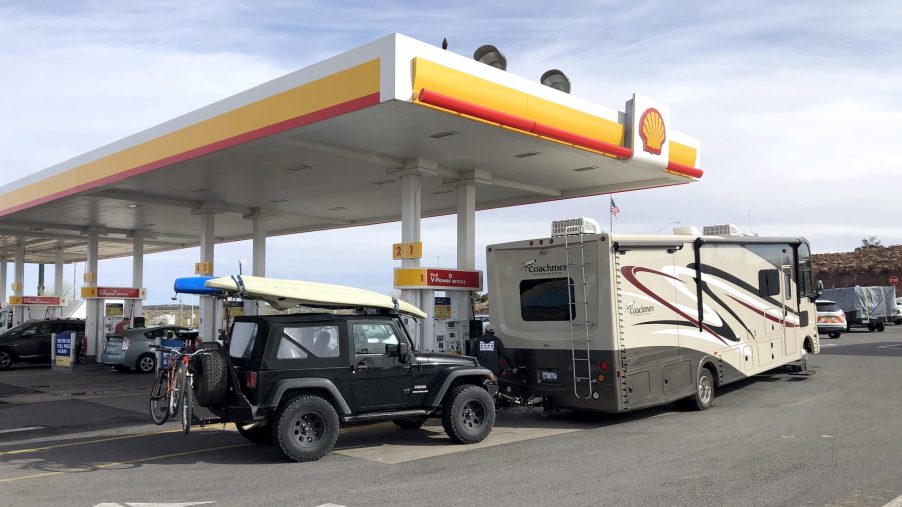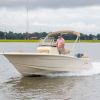
RV Triple Towing: Which States Allow It?
Ready to hit the lake with your new jet skis? Sounds fun, especially if you’re bringing your camper along. There’s more to towing an RV than just hitching up and peeling out of the driveway, however.
If you’re not familiar with triple towing, you might want to take some time to learn more about it, especially which states allow it and which states don’t. It can be a ton of fun, but only if you arrive safely.
What is triple towing?
If you’re an old hand to the RV world, then you probably know exactly what triple towing is, as you’re used to the lingo. For anyone who is just now preparing to go on their first RV trip, or have gotten enough experience to branch out, triple towing may not be as familiar to them.
According to Good Life RV, “Triple towing is when you are towing a trailer (like a fifth wheel) behind a towing vehicle and then attach another trailer to the fifth wheel for a third vehicle. An example could be a snowmobile or equipment trailer.”
As you can see, it’s definitely not for the faint of heart, or the hesitant of driving. Being able to take your favorite toys on vacation is too much fun for some people to ignore, however.
Although this type of towing is known as “triple towing” in the RV world, a commercial trucker may know it as “hauling doubles.”
Where can you triple tow?
Before you hook up your boat to go fishing in another state, you need to check and make sure that the states you’ll be traveling through allow triple towing. While many states are just fine with it, according to Camper Report, there are just as many that don’t. It’s better to know before you plan out your trip before you see blue lights in the rearview mirror.
If you break it down, about half the states in the U.S. allow triple towing. For the states that do allow it, they have their own set of rules, such as how fast you can go while triple towing, and the maximum vehicle towing length.
For example, in Idaho, you can triple tow 75 feet, but can’t exceed speeds of 65 mph. This is actually rather common for the states that do allow triple towing, although it’s not the same across the board. Indiana only allows a 60 feet maximum towing limit.
While sites like Camper Report are great for learning where you can and can’t triple tow, it’s best to check online in the states you’ll be traveling through. A new law could be signed into effect, and you’ll want to know before you hit the road.
States that allow triple towing include: Alaska, Arizona, Arkansas, California, Colorado, Connecticut, Hawaii, Idaho, Indiana, Iowa, Kentucky, Louisiana, Minnesota, Missouri, Montana, Nebraska, New Mexico, North Carolina, North Dakota, Ohio, Pennsylvania, South Carolina, South Dakota, Tennessee, Utah, Vermont, and Wyoming.
States that don’t permit triple towing include: Alabama, Delaware, Florida, Georgia, Illinois, Kansas, Maine, Maryland, Massachusetts, Michigan, Mississippi, Nevada, New Hampshire, New Jersey, New York, Oklahoma, Oregon, Rhode Island, Texas, Virginia, Washington, West Virginia, and Wisconsin.
Some states, like Michigan, may have special requirements for triple towing.
Tips for triple towing
Now that you know a little about what triple towing is, as well as where you can and can’t do it, let’s check out some tips for actually doing it. This will save you headaches later on down the line.
Before you begin, make sure your fifth wheel is equipped to tow another vehicle. This means having either a gooseneck hitch or a ball hitch. If you’re looking at purchasing a fifth wheel, this would be a great time to check before you actually sign on the dotted line.
Second, learn what your unladen vehicle weight is. This means how much your fifth wheel weighs before you load it up. It matters because many states require that the second vehicle you tow not exceed the unladen vehicle weight.
Finally, towing so much weight can add a lot of wear and tear to your fifth wheel. Getting it checked out for necessary maintenance will help you arrive at your destination safely.


